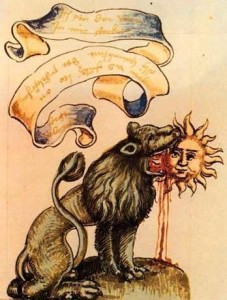Holiday pain, a crying cat, a broken heart
 “Habentibus symbolum facile est transitus.”
“Habentibus symbolum facile est transitus.”
(“To those who have a symbol, the transition is easy.”)
The day after Thanksgiving, I stopped at a service station on Hill Street in Grant Park. Between this station and I-20 is some wooded land in which homeless people live. It is also home to many feral cats.
As I was pumping my gas, I heard a cat crying. I looked across the parking lot and it was crouched by a car. I walked over to it and it didn’t take off as they usually do. The reason is that he was obviously dying. I leaned over to pet him and his appearance was so grotesque that I snatched my hand back. I noticed another cat was crouched by protectively (or so I imagined).
Suddenly, without warning, I burst into tears. I’m not talking a few tears moistening my eyes. I’m talking uncontrollable sobbing. A homeless guy asked me if he could help. I got back in my car and could not stop crying for 10 minutes.
I’m extremely sentimental about animals but I knew the force of my reaction had a lot to do with feelings I’d been repressing for two days – grief about the death of my parents, guilt that I’d not spent more time with them, the wish that things had been different between us. Also, I never experience any death without being overwhelmed by memories of the years when all my friends – and I do mean all of them – were dying from AIDS. That experience traumatized almost every gay man of my generation.
The power of images
The sentence atop this post – roughly translated as “To those who have a symbol, the transition is easy” – is a Latin motto adopted by alchemists. Carl Jung mentioned it in his work. It expresses a central principle of Imaginal Psychology too. The idea is that images have the power to transform us. It doesn’t mean that symbols make transition to a new state-of-being painless. It does mean that certain images, internalized, can easily facilitate the confrontation with unconscious contents that transformation requires.
Dreams are rife with such images. On Thanksgiving morning, I had a dream of great intensity, dense with images alluding to my dead mother and father and my relationship with my partner. I engaged in some analysis of the images but did not let their emotional content emerge. Still, they haunted me all day. Each time they recurred, I looked away.
One of depth psychology’s most useful observations is that whatever is repressed internally eventually returns to confront us on the outside. That’s what the cat was about, no doubt. Its awful suffering confronted me in a purely emotional way that caused my feelings to erupt. As a symbol of suffering it forced me to acknowledge the intense grief I was trying to avoid feeling.
But how was this transformative? It was cathartic, of course, and catharsis always helps relieve stress. It’s also true, though, that catharsis is too often the sole goal of psychotherapy. Without paying close attention to what we experience during our “venting” – especially bodily experience – our “transition” to another state of being is usually quite superficial. It’s like taking a pain killer for chronic pain or loosening a knot rather than untying it.
My sobbing stopped after about 10 minutes, but the image of the crying cat stayed in my mind’s eye all day, causing waves of sadness. But I focused my attention on the image of the cat throughout the day and as I did so, I literally felt my heart opening. I do not mean this in a metaphorical sense. I could literally feel my heart, which I regard as an organ of perception, opening. This is a bittersweet feeling. The world looks softer. The unavoidable experience of suffering seems more acceptable.
Paradoxically, then, the image heals not by anesthetizing us against pain but by making it intimate, forcing its internalization. It’s a direct expression of the Buddha’s first noble truth: “life is suffering.” And by acknowledging this, the pain of life dissolves into a bittersweet truth like the inevitable experience of heartbreak itself.
There are 2 Comments to "Holiday pain, a crying cat, a broken heart"
thank you for the latin saying ~ that, as well as the rest of your post, is going to resonate with me for awhile. i also have a tendency to get the “scientific” messages of my dreams while overlooking the emotional morals of the story, so-to-speak.
Very moving post, a friend here in New York sent the link to me. I also checked out your website — some really interesting work you do. I wish you would write more about images and change. It occurs to me that this explains why fascists are so terrified of art. Do you think?